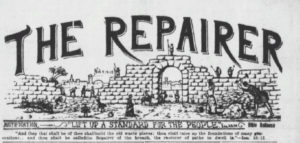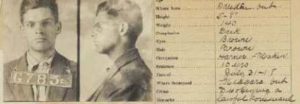Free Methodist Pacifism
Apparently, by World War I, the Free Methodists, founded as a radical revolt against Methodist fund-raising practices of pew rental, which excluded the poor from worship, were themselves becoming a fairly institutionalized denomination. With a history of Abolitionism and ministry to the poor, they still thought of themselves as radical. Most Free Methodists did not openly resist World War I and certainly, there was no official position of the denomination against support of war.
E. E. Shelhamer, a Radical Free Methodist Evangelist in Atlanta, Georgia, wrote a book, Radical Versus Popular Holiness Contrasted. It is fair to say that Shelhamer saw the need for Holiness Denominations, like his own, Free Methodists, to maintain Holiness standards of separation from the world. E. E. Shelhamer, published The Repairer magazine as a tool of Radical Holiness evangelism. Not content to only publish on the evils of liquor and sabbath violation, The Repairer veered into dangerous territory, by seriously critizing American involvement in WWI. When E. O. Jolley, husband of Jennie Arthur Jolley, the Office Editor of The Repairer, wrote a pacifist article, it got The Repairer in serious trouble, with the Postmaster, and landed E. O. Jolley in a Grand Jury. His wife, Jennie was also seriously implicated and in great danger. With a charge of Espionage, The Repairer could have been shut down.
E. E. Shelhamer, published The Repairer magazine as a tool of Radical Holiness evangelism. Not content to only publish on the evils of liquor and sabbath violation, The Repairer veered into dangerous territory, by seriously critizing American involvement in WWI. When E. O. Jolley, husband of Jennie Arthur Jolley, the Office Editor of The Repairer, wrote a pacifist article, it got The Repairer in serious trouble, with the Postmaster, and landed E. O. Jolley in a Grand Jury. His wife, Jennie was also seriously implicated and in great danger. With a charge of Espionage, The Repairer could have been shut down.
At least four Free Methodists were found in the Swarthmore College list of Religious Objectors to WWI who were incarcerated at Ft. Leavenworth Military Barracks in Kansas: Milton Haworth (Steel Worker), Ruthven H. Lacy, Thomas Morgan (African American), and Lawrence W. Trebether.
Will Anderson, FM, WWI Draft Registration Card
Will Anderson, a Central College (Free Methodist) student in 1915, and in 1917 he requested exemption from military service in WWI because of “religious scruples.”
Benjamin John Rossman, FM WWI Draft Registration Card
Benjamin Rossman gave as a reason for religious exemption from military service that he was a “member Free Methodist Church.”
Arthur Charles Wilson, FM WWI Draft Registration Card
I searched for Free Methodist clergy in the 1930 Federal Census. One of the ministers I found was Arthur Wilson and the census informed me that he was not a WWI veteran. Further searching found his draft card from Seattle, WA, where he was a house painter. He asked for exemption from military service because, he “does not believe in war.” The registrar recorded, “This party does no believe in war because he does not want to kill his fellowman.”
A Canadian Free-Methodist man, Sherman Babcock was imprisoned in Kingston, Ontario, Penitentiary for failure to obey a lawful command. At the time that was code for a religious objector who was drafted and who refused to serve and who was forcibly inducted and then court-martialled for failure to obey orders.
We know he was Free Methodist because he told them this on his Attestation Form.

